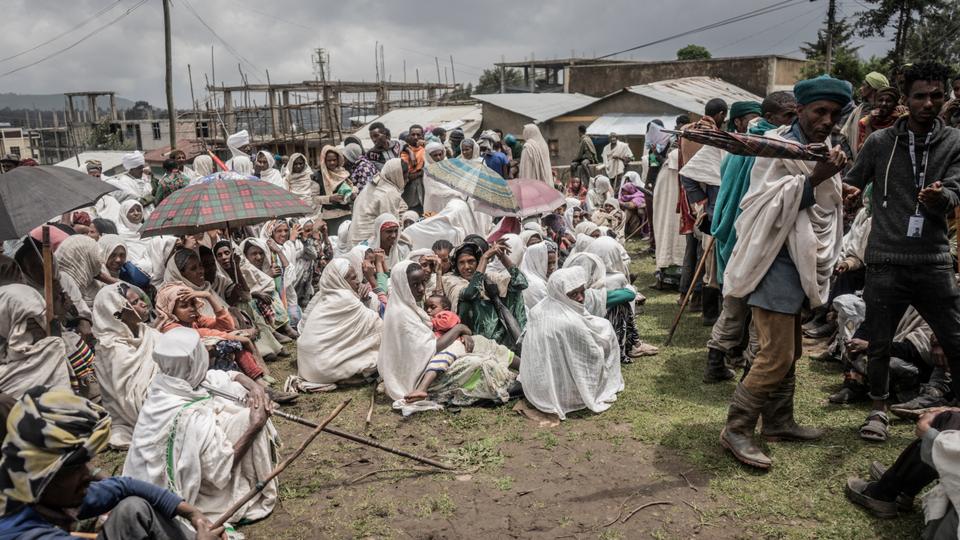Hundreds of aid trucks have not returned from Ethiopia’s war-hit Tigray region, and their disappearance is “the primary impediment” to ramping up the humanitarian response, the United Nations said.
The disclosure from the UN’s World Food Programme (WFP) on Friday comes amid rising fears of starvation deaths in Tigray, where the UN has previously estimated that 400,000 people faced famine-like conditions.
Since July 12, 445 contracted non-WFP trucks have entered Tigray, but only 38 have returned, WFP spokeswoman Gemma Snowdon said in a statement.
“At the moment this is the primary impediment to moving humanitarian aid into Tigray. We are unable to assemble convoys of significant size due to lack of trucks,” Snowdon said.
“We are continuing to work with transporters and local authorities in Tigray for trucks to be released.”
WFP has no information about where the trucks are or what they are being used for, Snowdon said.
READ MORE: More aid trucks arrive in Ethiopia’s war-ravaged Tigray
Trading blame
Tigray has been mired in conflict since November when Prime Minister Abiy Ahmed sent troops to topple the regional ruling party, the Tigray People’s Liberation Front (TPLF), a move he said came in response to TPLF attacks on army camps.
The 2019 Nobel Peace Prize winner promised a swift victory, but the TPLF retook much of Tigray including its capital Mekelle in June and Abiy then declared a humanitarian ceasefire.
But the UN says Tigray remains under a “de facto blockade” and has warned of a “looming catastrophe” as fighting has dragged on and spread to neighbouring regions.
The Ethiopian authorities and Tigrayan rebels have blamed each other for obstructing humanitarian convoys trying to reach Tigray.
READ MORE: The enduring legacy of protracted conflicts in Ethiopia
A government Twitter account on Thursday referred to “suspicions that TPLF (is) seizing trucks for own logistics”.
But TPLF spokesman Getachew Reda cited obstacles drivers faced while entering Tigray from neighbouring Afar region, adding they have “nothing to do” with Tigrayan officials.
“Drivers of trucks that UN has commissioned complain about fuel availability, (security) concerns, harassment at checkpoints, being stranded at Afar for months, etc,” he said on Twitter.
A humanitarian official in Tigray, speaking on condition of anonymity, said many truck drivers were Tigrayan and had faced ethnically motivated harassment at checkpoints while heading into the region.
US paves way for sanctions
Also on Friday, US President Joe Biden signed an executive order allowing for sanctions against the warring parties in Ethiopia’s Tigray region if they fail to commit to a negotiated settlement.
In a statement, Biden called the situation a tragedy and said, “I am appalled by the reports of mass murder, rape, and other sexual violence to terrorise civilian populations.”
The executive order establishes a “sanctions regime to increase pressure on the parties fuelling this conflict to sit down at the negotiating table and, in the case of Eritrea, withdraw forces,” a senior US administration official said.
Secretary of State Antony Blinken said the US would delay sanctions if the Ethiopian government and the TPLF “cease ongoing hostilities and enter into ceasefire negotiations immediately and without preconditions”.
“If the parties take immediate steps in this regard, the United States is prepared to delay the imposition of sanctions and focus on supporting a negotiated process,” Blinken said in a statement.
Blinken also demanded that Eritrea withdraw its forces from Ethiopia.
The order gives the Treasury Department “the necessary authority” to sanction the governments of Ethiopia and Eritrea, and the Tigray People’s Liberation Front among other parties.
Unless these parties take “concrete steps” to resolve the crisis the United States is prepared to impose sanctions against a wide range of individuals and entities in coming weeks, the administration official said without specifying who or what organisations might be targeted.










Discussion about this post